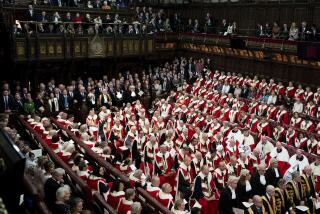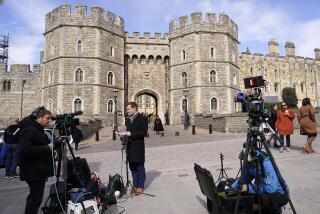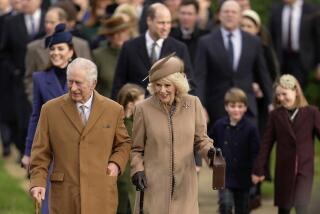British Monarchy Mulls Radical Change
- Share via
LONDON — Led by Queen Elizabeth II, the royal family is weighing reforms that would revolutionize and modernize the British monarchy, Buckingham Palace acknowledged Monday.
The proposals would abolish state subsidies to the royal family and offer equal rights for women to succeed to the throne. They would allow an heir to the throne to marry a Roman Catholic and end the sovereign’s current role as head of the official Church of England.
A spokeswoman at the palace Monday would not confirm specifics and said no changes were imminent. But she said the monarchy’s future is regularly discussed by the queen; her husband, Prince Philip; and her eldest son and heir, Prince Charles, with their advisors and government legal experts.
“Discussion of strategic issues and major topics for the future go on in this organization as in any organization. One reason the monarchy has endured for 1,200 years is that it has been able to adapt to changing times,” the spokeswoman said.
Recent divorce and adultery scandals have damaged the royal family’s image; a left-wing think tank last week called for the queen to be stripped of her role as head of the Commonwealth, and leftists were skeptical Monday of the bruited reforms.
“You can’t have a democracy where the head of state rules by inheritance, not by election,” said Tony Benn, a hard-line member of the opposition Labor Party.
Lord St. John of Fawsley, a constitutional expert, said the all-in-the-family discussions, described by the palace as ongoing, “might have been brought on by the family’s recent troubles.”
“The queen is acting coolly, sensibly and rationally as is her wont. She’s looking to the future of the monarchy. She’s 70 now, and this is a good time,” he said.
A financial reform being studied would abolish the Civil List, under which $14 million or so in public funds is paid annually to Elizabeth, Philip and the Queen Mother. Since 1992, the queen has herself paid about $2.5 million annually to eight other members of the royal family technically entitled to government funds.
Another reform would allow a firstborn daughter to succeed to the throne, challenging the ancient law of primogeniture. At present, a monarch’s daughter becomes heir only if--like Elizabeth--she has no brother or if her brothers and all their descendants are dead.
Allowing an heir to marry a Catholic would overturn a 1701 law. It was written after prolonged violence between Protestants and Catholics following King Henry VIII’s creation of the Anglican Church; he founded the church after his break with the pope in 1534. “The surprising thing is that it has not happened before. The heir to the throne can marry a Buddhist, a Jew or a Muslim, but not a Catholic,” said William Oddie, a Catholic writer.
Ending the monarch’s role as supreme governor of the Church of England--a role often criticized as anachronistic--would effectively separate church and state for the first time since Henry’s days. “In a multiracial, secular society, where there are people of many religions . . . is it really appropriate that the head of state should be head of one of the churches?” asked Stephen Twigg, leader of the left-wing Fabian Society.
Taken together, the reforms, all of which would entail prolonged debate and parliamentary approval, would amount to the most radical structural changes in the monarchy in centuries, British analysts said Monday.
In reporting the possible changes, newspapers attributed the impetus for the royal discussions to Elizabeth. But reform is reportedly also strongly supported by her son Charles, the future king. “This is very much Charles’ agenda. He’s been playing around with these ideas for years,” said David Starkey, a lecturer in history at the London School of Economics.
More to Read
Sign up for Essential California
The most important California stories and recommendations in your inbox every morning.
You may occasionally receive promotional content from the Los Angeles Times.










